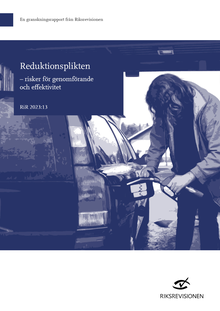Several risks to the implementation and effectiveness of the greenhouse gas reduction mandate
The reduction mandate contributes to Sweden’s chances of reaching its climate objectives. However, the current design is not fully feasible and risks leading to a number of unforeseen consequences. The Swedish National Audit Office (Swedish NAO) recommends that the Government produce better assessments ahead of new decisions.

Photo: Maskot
The Swedish NAO’s audit shows that compared with other measures in the transport sector, the greenhouse gas reduction mandate has the potential to contribute, above all, to the objective of reduced emissions from domestic transport at a reasonable cost.
However, with its current design, it is not possible to implement the greenhouse gas reduction mandate by 2030 in the way that the Riksdag has decided. This is because current regulations and existing technology within a few years’ time does not allow such a large addition of biofuels as the current reduction mandate will require.
The Swedish NAO further notes that the greenhouse gas reduction mandate has so far driven up the price of diesel at the pump more than the Government anticipated. This is partly due to an unexpected increase in the price on biofuels. Under its current design, the greenhouse gas reduction mandate can have a very large impact on the price of diesel closer to 2030.
Apart from the fact that this reduces the cost advantage of the reduction mandate compared to other measures to achieve lower greenhouse gas emissions in the transport sector, it also leads to greater distribution effects than the Government had anticipated. For example, households in rural areas are generally more affected by more costly fuel than households in cities.
The increase in the price of biofuels also entails an increased risk that fuel suppliers might choose to pay a penalty rather than adding biofuels. This would mean that the emissions reduction would be reduced or absent, which would make it significantly more difficult to reach the emissions target for domestic transport.
The audit also shows that the decisions to implement the greenhouse gas reduction mandate were based on documentation with serious shortcomings, where the Government and the Swedish Energy Agency repeatedly postponed carrying out analyses and impact assessments that were key to the implementation and effectiveness of the greenhouse gas reduction mandate.
“The Government did not provide the Riksdag with sufficient documentation ahead of the decision on the greenhouse gas reduction mandate,” says Auditor General Helena Lindberg.
The Swedish NAO’s assessment is that the effectiveness of the greenhouse gas reduction mandate as a policy instrument should also be viewed in relation to the overall national climate policy objective of net zero emissions of greenhouse gas by 2045.
“There may be more cost-effective measures outside the transport sector for reaching the overall climate objective, such as measures to increase the net uptake in Swedish forests, although this may involve other challenges,” says Peter Jörgensen, Project Leader for the audit.
Steeply increasing reduction levels under the reduction mandate means a sharply rising demand for biomass that could be used to reach climate objectives in other sectors and countries. This means that the greenhouse gas reduction mandate may lead to greater use of fossil alternatives elsewhere.
Recommendations in brief
The Swedish NAO’s recommendations to the Government include tasking the Swedish Energy Agency with producing complete impact assessments for the new design options for the greenhouse gas reduction mandate that the agency proposed.
See the report for the recommendations in full.
Greenhouse gas reduction mandate
The greenhouse gas reduction mandate was introduced in 2018 to contribute to Sweden’s efforts to achieve Sweden’s climate objective to reduce emissions from domestic transport by 70 per cent by 2030 (compared with 2010) as well as the overall target of net zero emissions of greenhouse gas by 2045. The greenhouse gas reduction mandate means that all fuel suppliers must reduce greenhouse gas emissions from fossil fuels by adding sustainable biofuel to petrol and diesel. The admixture is different for petrol and for diesel and will increase gradually until 2030.
Press contact: Olle Castelius, phone: +46 8-5171 40 04.
Presskontakt: Olle Castelius , telefon: 08-5171 42 06.
Share in social media and by e-mail
Contact form
Send your questions or comments via the form below and we will make sure that they reach the right member of staff. Please state if your question concerns the information on this particular page.


